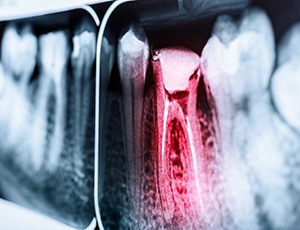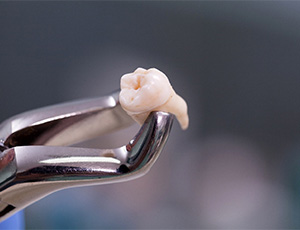Root Canal Therapy – Carrollton, TX
Restore Your Healthy, Pain-Free Smile
Do the words “root canal” send your teeth chattering in fear? Root canals certainly have one of the worst reputations in dentistry. However, at Epic Family Dentistry of Carrollton, there’s no reason to be afraid of them. In fact, this common tooth-saving treatment is designed to quickly relieve dental pain and stop infection in its tracks. Root canal therapy is used to preserve as much of your natural tooth structure as possible, which is much better than having it extracted entirely!
Dr. Afshin Azmoodeh firmly believes that great dentistry is built on trusting relationships. He’ll always take the time to get to know you, answer your questions, and ensure you feel as confident and comfortable as possible before your treatment. Contact us today to see if your oral health can benefit from root canal therapy in Carrolton!
How Do I Know If I Need Root Canal Therapy?

The soft, inner part of a tooth is called the dental pulp. While the dental pulp is usually protected by your enamel, untreated tooth decay or cracked enamel can expose it to bacteria. If these tissues become infected, you can experience a host of uncomfortable symptoms, like:
- Persistent, intense toothache.
- Tooth sensitivity to heat and coldness.
- Pain when chewing or applying pressure.
- Discoloration or darkening of a tooth.
- Swollen gums that have a small, pimple-like bump.
Unfortunately, your teeth can’t heal themselves like the rest of your body. Leaving an infected tooth untreated will only allow it to get worse, so the sooner you get a root canal, the better!
What Happens During Root Canal Therapy?

Many people fear root canals simply because they don’t know how they work. With today’s modern technology and techniques, root canal therapy isn’t a whole lot different than addressing a large cavity. First, Dr. Azmoodeh will use a local anesthetic to completely numb the area and ease whatever pain you may be feeling. In some cases, he may suggest sedation dentistry options like nitrous oxide or oral conscious sedation to help you feel as calm and relaxed as possible during your treatment.
Once you’re comfortable, your Carrollton dentist will use special tools to carefully remove all the infected dental pulp and disinfect the area to eliminate every trace of the bacteria. Then, he’ll fill the space where the decayed tissues were with a biocompatible material and seal up your tooth. Oftentimes, you’ll have a custom-made dental crown placed on top of the newly repaired tooth to strengthen it and protect it from future infections.
Are There Benefits to Getting a Root Canal?

Root canal therapy can quickly provide relief to a painful tooth and effectively treat the underlying infection. However, its benefits don’t stop there! Root canal therapy also:
- Lets you get back to eating, speaking, and enjoying your daily life without dental pain.
- Leaves your tooth pretty and protected thanks to the aesthetically pleasing dental crown.
- Stops infection in its tracks before it can spread throughout your mouth and body.
- Prevents the need for a tooth extraction, which has a much longer recovery time.
- Preserves your natural tooth structure, which prevents jawbone deterioration and changes to the facial features.
Our friendly and experienced team here at Epic Family Dentistry of Carrollton is dedicated to making every visit as pleasant as possible, whether you’re coming in for a simple cleaning or tooth repair. Call us today to see if root canal therapy can help you restore your healthy, pain-free smile.
Understanding the Cost of Root Canals

As much as you may need a root canal, perhaps you’re hesitating over its potential price. Fair enough – this treatment can often sound pricey due to its invasiveness. However, the cost of root canals varies from patient to patient; only our dentists can give you a precise estimate. Once you’ve seen us and learned the final tally, our team will also make your care more affordable. Learn more about how that all works by reading below or by calling us soon.
Factors That Can Affect Root Canal Cost

At your consultation visit, our dentists will give you a close oral exam. This process will (among other things) note the factors that affect your root canal’s final cost. These elements include (but aren’t limited to) the following:
- The Tooth’s Type or Location – A root canal’s price can increase or decrease based on which tooth it treats. The reason why is that different teeth have varying numbers of roots.
- The Root Canal’s Difficulty – Compared to a simple one, a complex root canal costs more. It can even require help from outside specialists in some cases.
- Any Additional Services – When you get a root canal, there’s a chance you’ll also get a dental crown or filling right after. Adding either of these two services to your overall treatment would raise its price.
Is it Cheaper to Pull My Tooth?

A tooth extraction may seem less costly than a root canal, at least at first. After all, the removal process has the lower upfront price. Even so, a root canal is actually the cheaper option in the long run.
The fact is that tooth loss (due to an extraction or not) has several harsh effects. For instance, the resulting smile gap can change your bite and shift your other teeth out of place. It’s also a bacterial breeding ground that raises your risk of tooth decay and gum disease. Once you factor in some later restorative work, such effects can make an extraction pricey.
With all that said, a root canal will save your tooth and your finances. Make sure to get one before an extraction becomes necessary.
Does Dental Insurance Cover Root Canal Treatment?

All in all, dental insurance does tend to cover root canal treatment. Most plans will cover anywhere from 50 to 80% of its cost. Root canal work is seen as vital and medically necessary, so plan providers often include it as a covered procedure.
On the other hand, don’t forget that every plan is different. There’s always a chance your dental insurance has its own guidelines on root canals. So, confirm your benefits with your plan provider before treatment. Our office can even help you with that process.
Other Options for Making Root Canal Treatment Affordable

Of course, insurance isn’t the only way to make a root canal affordable. You can also rely on our office’s unique payment options. The most notable of these is our CareCredit Financing service, which lets you work with CareCredit – an excellent third-party financier. It’d allow you to pay for your root canal in monthly installments.
Ideally, you see that our root canals don’t have to “break the bank.” Learn how to finance and get one by seeing us for a consultation.
Root Canal FAQs
How Long Does Root Canal Treatment Take?
Although the appointment will be longer, the procedure itself can range in time from 30 minutes to 90 minutes, depending on a couple of factors. For instance, the more roots a tooth has, the longer the procedure will be. Also, the location in the mouth may affect how long it takes to complete treatment. Before we perform the root canal, we can let you know what timing to expect so that you can plan your schedule accordingly. We may suggest or encourage you to take the rest of the day off work or school, especially if you take oral conscious sedation. Again, we can discuss details of your treatment beforehand directly with you.
Does Getting Root Canal Treatment Hurt?
No, it feels just like getting a filling. Again, we’ll give you a local anesthetic to numb the area, and for those who are nervous or need additional help relaxing, we can offer sedation. With these provisions, you should sit back, completely at ease and comfortable. Afterward, when the anesthetic wears off, you may have very slight soreness, but it usually subsides within a day or two.
Does Root Canal Treatment Cause Cancer?
Back in the early 1900s, a single dentist postulated that root canals and cancer (as well as other systemic medical conditions) are connected. Many, many studies have since refuted this claim, but somehow the rumor has persisted over the years and has risen again in popularity recently thanks to modern social media. But the truth remains: research shows no causal relationship. In other words, you can get root canal treatment without worrying about increasing your chances of any kind of cancer. In contrast, going without treatment will only lead to disastrous consequences for your oral and overall health.
What Is the Aftermath of a Root Canal Like?
Following this procedure, you may have minor soreness in your jaw or surrounding teeth, but any discomfort should be easily managed with over-the-counter pain medication for only a day or two. You may wish to have softer or less chewy foods during that time. However, if the pain continues beyond that point, gets more intense, or accompanies a fever, let us know right away. Otherwise, the restored tooth shouldn’t hurt and should be fully functional after a root canal.
